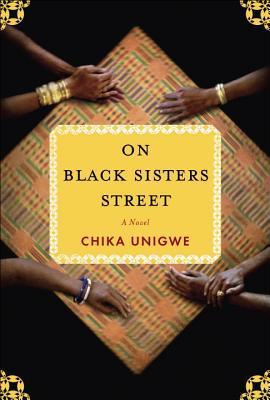
On Black Sisters Street
A Novel
- اطلاعات
- نقد و بررسی
- دیدگاه کاربران
نقد و بررسی

Starred review from January 10, 2011
In her U.S. debut, Nigerian immigrant Unigwe sets a melancholy tale in her adopted home of Belgium. When "Sisi" receives an offer from a questionable businessman to work in Belgium she accepts, agreeing to repay expenses as she works. She leaves the depressed, jobless Lagos only to find herself employed as a prostitute on Antwerp's Zwartezusterstraat (literally "Black Sisters Street") along with fellow Africans Ama, Joyce, and Efe. Despite her dire circumstance, Sisi falls in love with a native Belgian who encourages her to break free from her madam and the Lagos businessman. Freedom, however, remains elusive for Sisi, whose pitiful life is cut short with the swing of a hammer, prompting her Zwartezusterstraat sisters to share their own stories of fear, abuse, and violence, and allowing Unigwe to give powerful voice to women of the African Diaspora who are forced to use sex to survive. The author's raw voice, unflinching eye for detail, facility for creating a complex narrative, and affection for her characters make this a must read.

February 1, 2011
Four African women hoping for brighter futures find opportunity—and tragedy—working as prostitutes in Belgium.
While standing in the windows of Antwerp's red-light district (and sexually servicing up to 15 men a day) might not be anyone's idea of a dream job, it does offer the young immigrant roommates at the heart of this page-turner a chance at a better life. Although their personal motivations differ, they are united by their obligation to Dele, a portly, powerful Nigerian "businessman." Based in Lagos, he offers them passports and travel expenses with the stipulation that they send him a hefty cut of their earnings each month to pay off their considerable debt. Once in Antwerp they are placed under the care of "Madam," a hard-nosed African woman with questionable loyalties. Sisi, the most educated of the group, leaves behind a good man, Peter, whose modest ambitions don't mesh with her big dreams. Efe sacrifices her own happiness to support her young son L.I., who lives back home with her younger sister, while moody Ama flees an abusive stepfather. The youngest, Joyce, was born Alek in Southern Sudan. A survivor of wartime atrocities, including rape, she follows Polycarp, a kindly seeming Nigerian soldier, back to Lagos. But their romance sours when Polycarp's mother forbids him from marrying the refugee. He then goes to Dele and pays Joyce's way to Belgium, where she, unlike the other women, initially believes she will be working as a nanny. In spite of her reluctance, her beauty soon attracts a devoted clientele, while she plots to someday open a boutique back in Africa. Sharing a modest apartment, the women bicker and bond until Sisi meets Luc, a white banker, in a Pentecostal church. He pursues her, offering a way out from the brothel. But Sisi's belief that she can escape Dele's considerable reach proves to be a fatal mistake, with far-reaching consequences for the others. In her English-language debut, the Nigerian-born Unigwe convincingly exposes an unfamiliar world without sentimentality.
Capable drama that puts a human face on the scourge of human trafficking.
(COPYRIGHT (2011) KIRKUS REVIEWS/NIELSEN BUSINESS MEDIA, INC. ALL RIGHTS RESERVED.)

February 1, 2011
In Nigerian-born Unigwe's second novel, the main character's murder propels the narrative forward in order to answer the question of how she died. Her death also spurs the other three main characters to share their stories. All four women are prostitutes in Belgium, and all came from poverty in Africa, lured by the false promise of European riches. The murder of one causes the three others to share their tales, each more heartbreaking than the last. This is a novel of desperation, sexual exploitation, and, ultimately, sisterhood. There's little hope here, though the ending suggests that the surviving women endure and finally make a life on their own terms. Unigwe has a talent for capturing the dashed dreams of young women who are stronger than they imagine. While the revelations about the murder are unsurprising, and the details about the red light district not particularly vivid, the women's personal stories are wrenchingly memorable. VERDICT Recommended for readers who enjoy novels about the struggle to survive amid African turmoil, such as those by Chimamanda Ngozi Adichie.--Evelyn Beck, Piedmont Technical Coll., Greenwood, SC
Copyright 2011 Library Journal, LLC Used with permission.

March 1, 2011
Unigwes gripping tale chronicles the lives of four African women working as prostitutes in Antwerps red-light district. Sisi, Efe, Ama, and Joyce live together, forced to repay their debt to the Lagos man who trafficked them under the pretense of a better life. Much of the action circles around the ambitious Sisi, an educated young woman who arrives in Belgium to escape the poverty of her hometown and seek her fortune in Europe. When Sisi is murdered, her death becomes a catalyst for the others to reveal their harrowing pasts. As an unwed teenage mother, Efe had few options for supporting her son after they were abandoned by the boys father. Ama overcomes an abusive childhood, and, tired of the predictability of daily life, longs to see the world. Joyce loses her family to unthinkable violence and is later betrayed by the man she loves. As Unigwe tells her characters stories in interweaving narratives and time lines, the women embody depths of fear and displacement, as well as the will to survive and prosper.(Reprinted with permission of Booklist, copyright 2011, American Library Association.)




دیدگاه کاربران